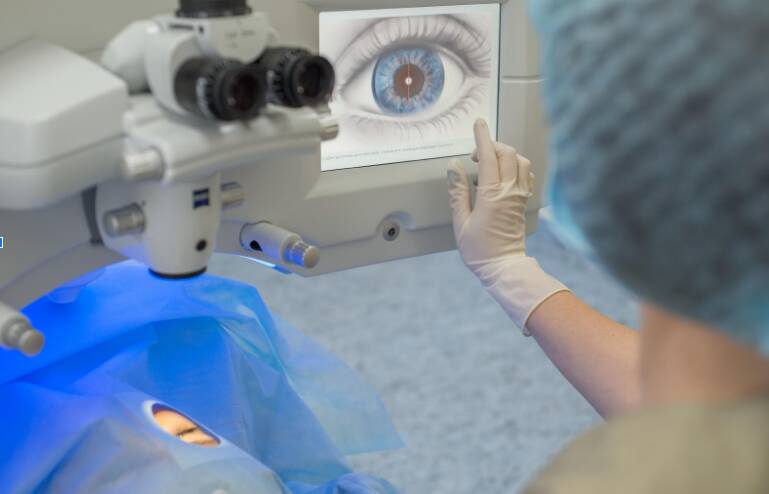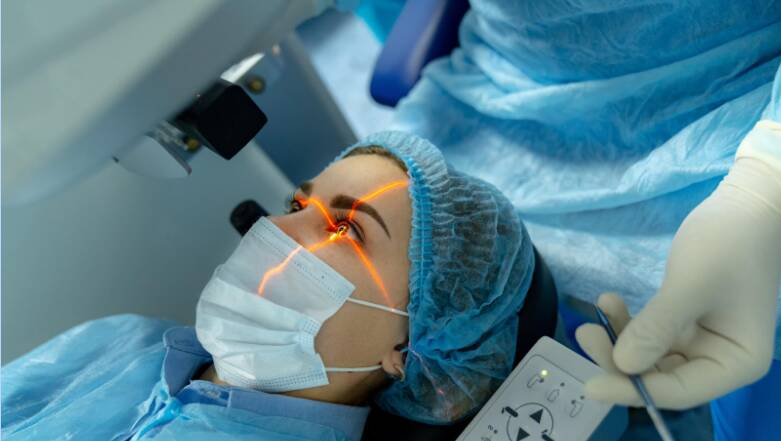10 considerations before getting laser eye surgery

This is branded content.
Tired of searching for your glasses every morning or dealing with contacts? Have you considered getting laser eye surgery? While the idea of tossing your lenses for good sounds tempting, it's not a decision to take lightly.
Laser correction is an effective way to fix nearsightedness, farsightedness, and astigmatism, but there are risks involved. Before going under the laser, you need to educate yourself on the procedures, evaluate your eye health, find the right surgeon, and set proper expectations.
With some thoughtful research and preparation, the laser can free you from glasses and contacts. But make sure you consider all the factors first. This guide will walk you through everything you need to consider beforehand.
1 Research your options
There are a few different types of laser eye surgery, and you'll want to understand the differences between them. The most common are:
- Laser-assisted in situ keratomileusis (LASIK)
- Photorefractive keratectomy (PRK)
- Small incision lenticule extraction (SMILE)
LASIK uses a laser to create a thin flap in the cornea, reshapes the cornea underneath, and places the flap back. PRK is similar but removes a thin layer from the cornea without making a flap. SMILE uses a laser to create a small incision and reshape the cornea through that opening. Compare the pros and cons of each procedure.
2 Choose your surgeon carefully
Make sure you pick an experienced, reputable surgeon. Ask how many procedures they've done, their complication rate, and what training they have.
Many doctors offer free consultations to discuss your options. Interview multiple surgeons before deciding. Check reviews and ask for patient referrals to get feedback on their bedside manner and surgical skills.
3 Understand the risks
While laser eye surgery is generally safe, you need to educate yourself on the potential side effects and complications. These include infection, under or over-correction, dry eyes, glare, and halos around lights at night. The chances of permanent vision problems are low but not zero.
You'll need to weigh the risks versus rewards for yourself. Discuss the possible side effects thoroughly with your surgeon so you can make an informed decision about whether laser eye surgery is right for you.

4 Consider your prescription strength
The higher your prescription (meaning, the worse your eyesight), the less likely laser eye surgery can fully correct it. Moderate nearsightedness and astigmatism have good outcomes.
If your eyesight is severely impaired, laser surgery may not be able to help. Talk to your doctor about realistic expectations.
5 Know your cornea thickness
Your cornea thickness is a key factor in determining if you're a good candidate for laser eye surgery. You need a thick enough cornea for the laser to be able to safely reshape it. People with thinner corneas have a higher risk of complications from the procedure.
Make sure your ophthalmologist measures the thickness of your corneas during your evaluation. Ask what the thickness requirements are for surgery at their practice. Having thicker corneas within the normal range will increase the likelihood of safe, successful laser vision correction.
6 Check your age
Laser eye surgeons typically only treat patients over 18 since your vision needs to stabilise first. There is no upper age limit, but the healing process takes longer the older you are. Most procedures are safest between ages 20 and 50. Talk to your doctor about the ideal age range for optimal results.
7 Review your eye health history
Certain eye conditions and health issues may rule out laser correction. These include glaucoma, retinal disease, corneal abnormalities, hypertension, and autoimmune disorders. Make a list of your medical history to discuss with your doctor. Be thorough, as undiagnosed issues can affect your outcome.
8 Stop wearing contacts
You'll need to stop wearing contact lenses for a while before laser eye surgery. Contacts slightly change the shape of your corneas, so you must go without them leading up to surgery for the doctor to get accurate measurements of your eyes.
Follow your surgeon's recommendations on when to cease contact lens use pre-surgery, as this varies case-by-case. Going without contacts ensures your corneas are in their natural shape for the pre-op evaluation and the procedure.
9 Understand the cost
Laser eye surgery is not typically covered by insurance since it's considered an elective procedure. Out-of-pocket costs range from $1500 to $7,730 per eye. Compare prices between surgeons. Ask what's included, what payment plans, what financing options are available, and what rebates or discounts you may qualify for.
10 Set aside recovery time
You'll need to take time off work and adjust your schedule after surgery. Healing and vision stabilisation takes around four to six weeks. Expect irritation, swelling, burning, and blurred vision for a few days post-surgery. Clear your schedule as much as possible for the first week to recover comfortably.
Final thoughts
Laser eye surgery lets you ditch glasses and contacts for good. But it's not a decision to rush into. Do your homework, find the right doctor for you, and weigh the risks versus rewards.
If you educate yourself thoroughly and have realistic expectations, you're more likely to be satisfied with the results. At the end of the day, only you can decide if laser correction is the right choice for improving your vision.


